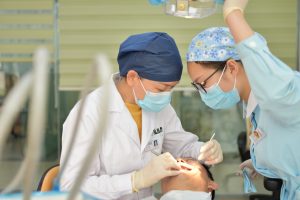The eagerly anticipated “Agenda for Change” (within the NHS) highlights once more just how far Scottish NHS dentists have fallen. The Doctors and Dentists Review Body (DDRB) amply demonstrates how they feel about dentistry and the professionals showing no improved recognition over the last two decades and no peer acknowledgement.
https://www.nhsemployers.org/pay-pensions-and-reward/agenda-for-change
We can never aspire to this but who works for nothing and how far are we prepared to be left behind? The question must be asked in relation to the act of NHS dental Items of Service (IOS) treatment because they impact hugely on everything that we and our staff do and receive.
The push towards better working terms and conditions for deserving staff has left the Statement of Dental Remuneration looking like a sorry and bedraggled postwar document which leaves practice owners and associates swimming against the tide. Pre-COVID, how might we have distributed less than £10 (for a filling) between associate, principal, receptionist, and nurse and aspired to anything like the Living Wage? It perhaps was just possible; the dentist having been prepared to carry out the dentistry for nothing. There will be no incentive to ramp up numbers mid-pandemic, obey targets or muddy the risk assessments.
The patients feel as though they are being passed from pillar to post, whilst the majority understand the predicament in which Scottish NHS dentists find themselves. Only we can allocate the priorities insofar as they may impact on the health of our patients and staff. Of course, no one wishes to work for nothing although pre-COVID, many NHS dental treatments were remuneratively meaningless as highlighted above. Post-furlough they will become what they were before the pandemic with the additional economic drag of fallow. Evidently, there will be times that we decide to act in a way that may be financially self-punitive, but these times will be sparing and only in the patient’s interests. Targets will be publicly perceived as irresponsible.
We are inextricably linked to the public sector pay review process yet denied access to the many conditions given to the public sector by right, because of year on year attritional increments on the SDR. This uncomfortably sits along with uncorrelated financial demands on both clinical and non-clinical governance.
The pressures on dentists have been exacerbated by the righteous aims regarding the “Living Wage” for all staff. As a profession, we are encouraged to be aware of our employer obligations, but the Scottish Government cannot neglect their duty (by proxy) to our staff. We can assume, since no proposals are forthcoming, that Scottish Government are not inclined to replace the existing model. We can therefore encourage our members and supporters to accept nothing without proper negotiation. The current status quo of discussion on “good terms” always ends with enforced suggestion.
Scottish Government may consider the position of struggling primary care services in relation to Scotland’s general, oral, and dental health. They may wish to take this opportune moment to negotiate in earnest as we watch more dental practices migrating more towards ‘private’ oral healthcare and sustainable business model.
Various proposals have been mooted including several within the suspended: Oral Health Improvement Plan, Childsmile, dietary/oral hygiene/fluoride advice and application, Flu jabs. There have been other suggestions such as blood pressure, diabetes mellitus checks and measures. As far as most practice owners and associates are concerned, the slate should now be wiped clean and the time to shape our practice and practise profiles is nigh, A growing minority have already made significant permanent changes to their commitments.
It is imperative that Scottish Government do not leave too few remaining when it comes to maintaining (and potentially augmenting some of) the General Dental Services. This is particularly so as more links to and from deprivation, oral health and systemic disease are uncovered. Consider the impact on community dental services, oral surgery, sedation, general anaesthetics (referral and action protocols) as they might back up on primary care. Failure to act now and instigate an actual negotiation will undoubtedly result in a compressed, disinclined and failing oral healthcare system.
We are now seeing the negative impact of COVID-19 on oral health, upon much of which we may have limited powers to remedy. As service providers to our NHS patients, this has very much become a service with the emphasis on health. And that now clearly cuts two ways.
In summary, we will continue to focus on caring for our patient’s health, but we will not be encouraged to increase risk. Nor will we return to anything like the levels of pre-COVID activity in the absence of actual negotiation.









